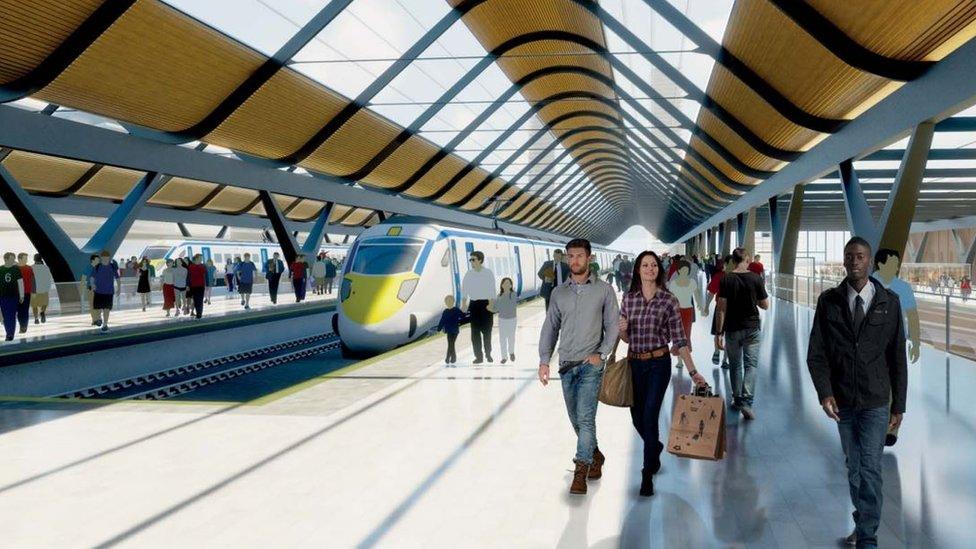HS2: Give me the facts, says Shapps
- Published
- comments
HS2: How much work has already been done?
The transport secretary has asked for more data before making a "massive decision" on HS2 as it emerged the new high-speed rail link could cost £106bn.
A leaked report suggested the project could cost almost double from the £56bn expected in 2015.
Grant Shapps said he has demanded more information about the scheme as the government prepares to decide whether to go ahead with the project.
Downing Street refused to comment on the contents of the leaked report.
Mr Shapps told Sky News that the "massive decision" on whether to go ahead with HS2 "needs to be fact-based".
He said he had told the report's author, Doug Oakervee: "Give me the facts, give me the data, give us the information so we can make a proper informed decision."
The unpublished report, which was leaked to the Financial Times, external, said there was "considerable risk" that estimated costs could rise by another 20%.
"I've always approached this from a relatively neutral point of view and that information will help to inform a decision that is best for the whole country," Mr Shapps said. "We'll be making a final decision, along with the prime minister and the chancellor, on this very shortly," he added.
What does a billion pounds look like... and what can it buy?
The government previously promised to make a decision before the end of 2019. Along with a warning on costs, the report also made a number of suggestions.
Among those was a recommendation to pause the second phase of the project while experts look at whether conventional lines could help link Birmingham to Manchester and Leeds instead.
But the Mayor of Greater Manchester, Andy Burnham, told the BBC's Today programme it would "not be acceptable" if the North of England portion of HS2 was delayed or downgraded to slower speeds.
"To me that would be the same old story. London to Birmingham, money is no object, and then all the penny pinching is done in the North of England," he said.
Mr Burnham said the development of an east-west rail route across the North - known as HS3 or Northern Powerhouse Rail - relied on HS2 being built.
However, Lord Berkeley, a vocal critic of HS2 who was deputy chairman of the review before withdrawing his backing, said: "I suspect that most of the people who like to use the trains around Manchester and Leeds would rather have a really good commuter service just like there is in London, rather than get to London half an hour quicker."
Some £8bn has already been spent on the project, which will connect London, the Midlands and northern England using trains capable of travelling at 250mph.
West Midlands' mayor Andy Street said he still expected the project to go ahead.
"It will drive the regeneration of our economies in Birmingham, in Manchester, in Leeds and other cities in the Midlands and the North," he told the BBC. "No government committed to levelling up around the country would possibly turn its back on that opportunity."
£55.6bn Existing budget
£32.7bnOriginal budget
£7.4bnAlready spent on the project
9,000Jobs supported by the railway
345 milesNew high-speed track
50 minutesJourney time saving between London and Manchester
In a letter to Prime Minister Boris Johnson some of the UK's largest construction firms warned that cancelling the project would do "irreparable damage" to the industry, costing thousands of jobs, the Times newspaper reported, external.
Balfour Beatty, Skanska, Morgan Sindall, Costain, Mace and Sir Robert McAlpine are among firms arguing that a dearth of other big projects mean skills could be lost.
Claire Walker, co-executive director of policy at the British Chambers of Commerce, told the BBC that the project must go ahead.
"Business communities are united that this project should be delivered and should be delivered in full," she said. "There is no project that has been proposed that will go so far in delivering the transformational change to the Northern business communities as this project will."
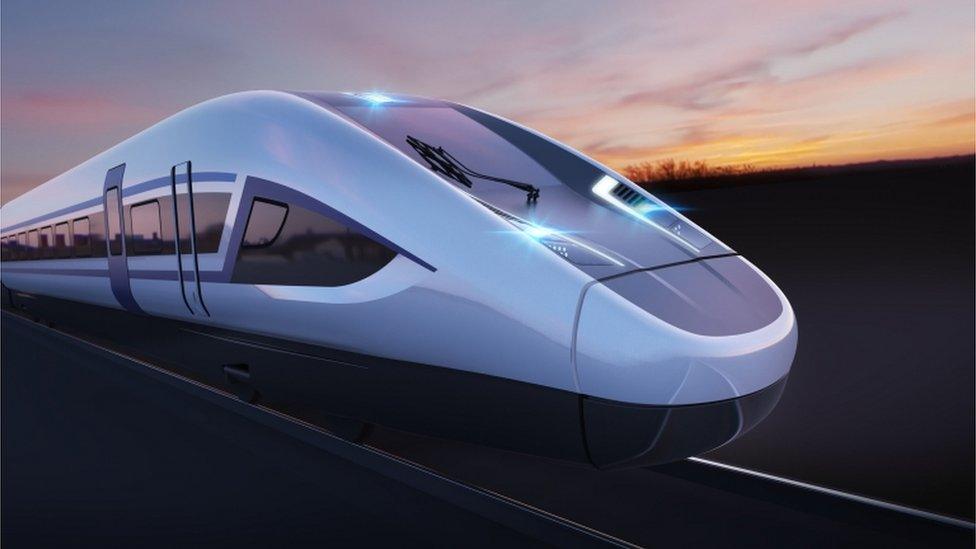
A proposed design for an HS2 train
The first phase of project, between London and Birmingham, is due to open at the end of 2026, with the second phase to Leeds and Manchester expected to be completed by 2032-33.
Despite concerns about the rail link, Europe's largest infrastructure project, work is not on hold and the project currently gets through about £250m a month.
"The North's civic and business leaders have argued tirelessly that major infrastructure investment is so badly needed to provide the capacity so urgently needed on our rail network," said Northern Powerhouse Partnership Director, Henri Murison.
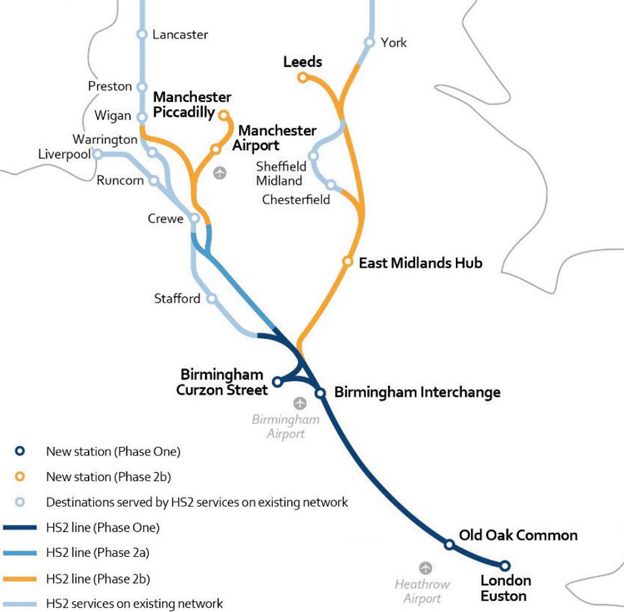

Trains on the London to Birmingham route would be 400m-long (1,300ft) with up to 1,100 seats. They would run as many as 14 times per hour in each direction. The Department for Transport says the project will cut journey times between the cities from one hour 21 minutes to 52 minutes.
Once the second phase is complete, Manchester to London journeys would take one hour seven minutes (down from two hours seven minutes), and Birmingham to Leeds would take 49 minutes (down from two hours).
This would effectively reduce journey times between London and Edinburgh and London and Glasgow by an hour, to three-and-a-half hours.
The government hopes its creation will free up capacity on overcrowded commuter routes.


If you've followed the HS2 drama, then an estimate of £106bn for the entire project isn't surprising. But the fact that it's in yet another leaked draft of the government's review makes it part of the official narrative.
Those opposed to HS2 feel a perfect storm is brewing. Conservative MPs (including ones newly elected in constituencies in the north of England) are pressing the PM to reconsider; the government's spending watchdog will soon publish a critical report; and Boris Johnson's transport advisor, Andrew Gilligan, is sceptical about the scheme.
Tinkering with the project (reducing the speed of the trains or adding a station in between Birmingham and London) won't save much money and would slow the line down, defeating the point of it being super-high speed.
So, in broad terms, it feels like the government has an all-or-nothing decision to make. HS2 currently burns about £250m a month, so you'd think the government would be in a hurry to make up its mind.
But the fact we're told this 'isn't a final draft' of the review (even though we were previously told that the review should have been done at the end of last year) suggests government insiders are keeping their options open. A decision will probably come, I'm told, after Brexit.
HS2 has always been split into fairly distinct parts (Phases 1, 2a and 2b) so putting the second phases on hold for a bit longer while further options are explored wouldn't in itself be a radical option.
But the project has a lot of support from political and business leaders in the north of England and the Midlands, so if the government was then to scale back that second stretch of the railway it would cause a bit of a storm.

- Published12 November 2019
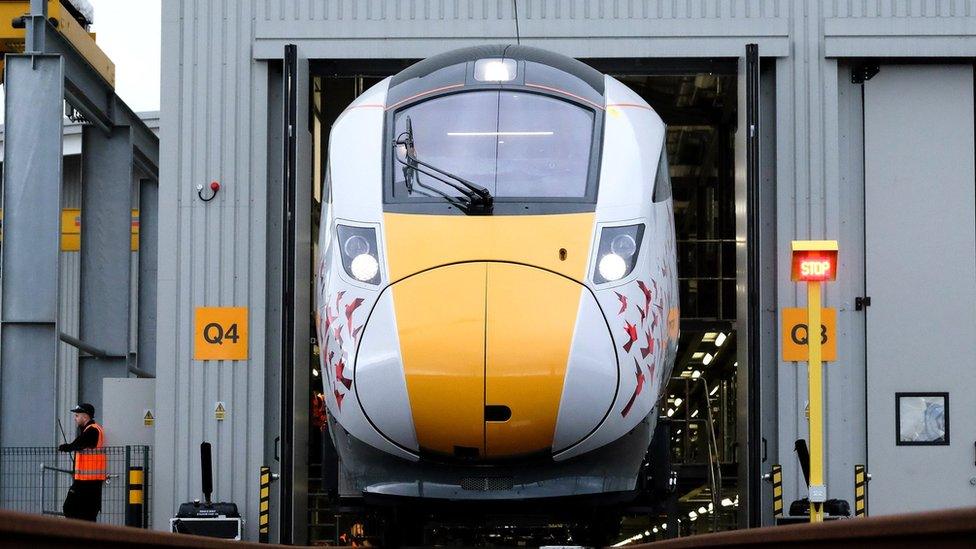
- Published5 January 2020
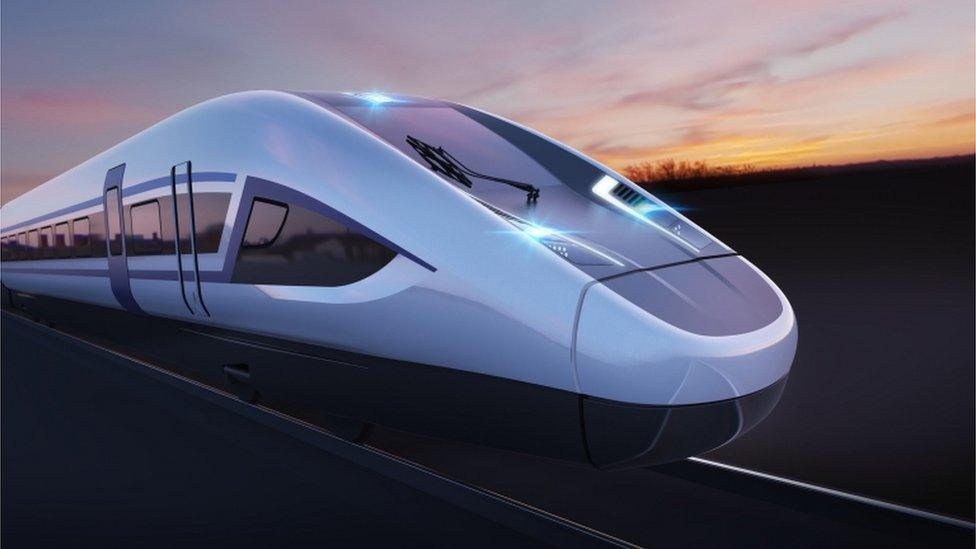
- Published15 January 2020

- Published6 October 2023
